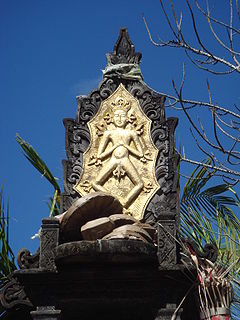Related Research Articles

Allah is the Arabic word for God in Abrahamic religions. In the English language, the word generally refers to God in Islam. The word is thought to be derived by contraction from al-ilāh, which means "the god", and is related to El and Elah, the Hebrew and Aramaic words for God.
Agnosticism is the view that the existence of God, of the divine or the supernatural is unknown or unknowable. Another definition provided is the view that "human reason is incapable of providing sufficient rational grounds to justify either the belief that God exists or the belief that God does not exist."

Abraham is the common patriarch of Christianity, Islam, Judaism, and some other religions. In Judaism, he is the founding father of the covenant of the pieces, the special relationship between the Hebrews and God; in Christianity, he is the prototype of all believers, Jewish or Gentile; and in Islam he is seen as a link in the chain of prophets that begins with Adam and culminates in Muhammad.

Calvinism is a major branch of Protestantism that follows the theological tradition and forms of Christian practice set down by John Calvin and other Reformation-era theologians.

A devil is the personification of evil as it is conceived in many and various cultures and religious traditions. It is seen as the objectification of a hostile and destructive force.

The Book of Genesis, the first book of the Hebrew Bible and the Old Testament, is an account of the creation of the world and the origins of the Jewish people.
Love encompasses a range of strong and positive emotional and mental states, from the most sublime virtue or good habit, the deepest interpersonal affection and to the simplest pleasure. An example of this range of meanings is that the love of a mother differs from the love of a spouse, which differs from the love of food. Most commonly, love refers to a feeling of strong attraction and emotional attachment.

Moses, also called Moshe Rabbenu in Hebrew, is the most important prophet in Judaism. He is also an important prophet in Christianity, Islam, the Bahá'í Faith, and a number of other Abrahamic religions. In the biblical narrative he was the leader of the Israelites and lawgiver, to whom the authorship of the Torah, or acquisition of the Torah from Heaven, is traditionally attributed.

The resurrection of Jesus, or anastasis is the Christian belief that God raised Jesus after his crucifixion as first of the dead, starting his exalted life as Christ and Lord. In Christian theology, the death and resurrection of Jesus are the most important events, a foundation of the Christian faith, and commemorated by Easter. His resurrection is the guarantee that all the Christian dead will be resurrected at Christ's second coming. For the Christian tradition, the bodily resurrection was the restoration to life of a transformed body powered by spirit, as described by Paul and the Gospels, that led to the establishment of Christianity.
The name of God most often used in the Hebrew Bible is the Tetragrammaton. Owing to the Jewish tradition viewing the divine name as too sacred to be uttered it was replaced vocally in the synagogue ritual by the Hebrew word Adonai, which was translated as Kyrios ("Lord") in the Septuagint, the Greek version of the Hebrew scriptures. It is frequently anglicized as Yahweh or Jehovah and written in most English editions of the Bible as "the LORD".

The Christian doctrine of the Trinity holds that God is one God, but three coeternal consubstantial persons or hypostases—the Father, the Son, and the Holy Spirit—as "one God in three Divine persons". The three persons are distinct, yet are one "substance, essence or nature" (homoousios). In this context, a "nature" is what one is, whereas a "person" is who one is. The subset of Christianity that accepts this doctrine is collectively known as trinitarianism, while the subset that doesn't is referred to as nontrinitarian. Trinitarianism contrasts with positions such as Binitarianism and Monarchianism, of which Modalistic Monarchianism and Unitarianism are subsets.

An archangel is an angel of high rank. The word "archangel" itself is usually associated with the Abrahamic religions, but beings that are very similar to archangels are found in a number of religious traditions.

Jesus, also referred to as Jesus of Nazareth or Jesus Christ, was a first-century Jewish preacher and religious leader. He is the central figure of Christianity. Most Christians believe he is the incarnation of God the Son and the awaited Messiah prophesied in the Old Testament.

Adam is a figure in the Book of Genesis in the Hebrew Bible, from where he was adopted into Christian belief and the Quran. According to the creation myth of the Abrahamic religions, he was the first man. In both Genesis and Quran, Adam and his wife were expelled from a Garden of Eden for eating the fruit of the tree of knowledge of good and evil.

In monotheistic thought, God is conceived of as the supreme being, creator deity, and principal object of faith. God is usually conceived as being omniscient (all-knowing), omnipotent (all-powerful), omnipresent (all-present) and as having an eternal and necessary existence. These attributes are used either in way of analogy or are taken literally. God is most often held to be incorporeal (immaterial). Incorporeality and corporeality of God are related to conceptions of transcendence and immanence of God, with positions of synthesis such as the "immanent transcendence".

In Islam, God is the absolute one, the all-powerful and all-knowing ruler of the universe, and the creator of everything in existence. Islam emphasizes that God is strictly singular ; unique ; inherently One ; and also all-merciful and omnipotent. According to Islam, God is neither a material nor a spiritual being. According to Islamic teachings, beyond the Throne and according to the Quran, "No vision can grasp him, but His grasp is over all vision: He is above all comprehension, yet is acquainted with all things."
Atheism is, in the broadest sense, an absence of belief in the existence of deities. Less broadly, atheism is a rejection of the belief that any deities exist. In an even narrower sense, atheism is specifically the position that there are no deities. Atheism is contrasted with theism, which, in its most general form, is the belief that at least one deity exists.
God of War is an action-adventure game franchise created by David Jaffe at Sony's Santa Monica Studio. It began in 2005 on the PlayStation 2 (PS2) video game console, and has become a flagship title for the PlayStation brand, consisting of eight games across multiple platforms. Based in ancient mythology, the story follows Kratos, a Spartan warrior who was tricked into killing his family by his former master, the Greek God of War Ares. This sets off a series of events that leads to wars with the mythological pantheons. The Greek mythology era of the series sees Kratos follow a path of vengeance due to the machinations of the Olympian gods, while the Norse mythology era, which introduces his son Atreus as a secondary protagonist, shows an older Kratos on a path of redemption, which inadvertently brings the two into conflict with the Norse gods.
References
- ↑ Jordan, Michael (1993). Encyclopedia of Gods . New York, NY: Facts on File. ISBN 0-8160-2909-1.
 | This article about a deity is a stub. You can help Wikipedia by expanding it. |
| This article relating to a European folklore is a stub. You can help Wikipedia by expanding it. |